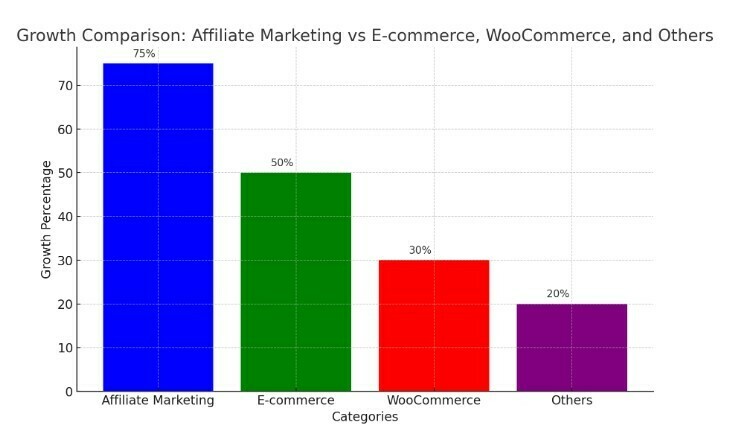
“Master Affiliate Marketing: How To Start Now” is what we’ll explore in this article. We also discuss the pros and cons and provide much more you need to know as to get you started today.
What Is Affiliate Marketing?
Affiliate marketing is a performance-based marketing strategy where individuals promote products or services of a company and earn a commission for each sale or lead generated through their unique referral link.
Affiliates promote these products through various channels, such as blogs, social media, or websites, and earn a commission based on specific actions, such as sales or clicks, originating from their promotions.
It’s an attractive model for monetizing their online presence without creating their products.
This form of marketing relies on the relationship between three main parties: the merchant, the affiliate, and the consumer.
The merchant provides a product or service; the affiliate markets this product to potential buyers through various forms of content.
If someone purchases the product through the affiliate’s promotion, it benefits the merchant, who then compensates the affiliate for their efforts.
How Affiliate Marketing Has Evolved Today?
Affiliate marketing has evolved over the years. Initially, it was primarily used by online retail giants like Amazon, but now it’s a common strategy across different industries.
This evolution has made it easier for individuals and businesses to participate and introduced sophisticated tracking and analytics tools to measure results more effectively.
Several key concepts in affiliate marketing are essential to understand, such as:
Cost Per Action (CPA), Cost Per Click (CPC), and Cost Per Sale (CPS). CPA means affiliates get paid when a specific action (like submitting a form) is completed.
CPC is when affiliates earn money based on the clicks their promotions receive. CPS is the commission earned when a sale is made through the affiliate’s link.
Knowing these can help affiliates choose the right programs and strategies.
Affiliate marketing isn’t to be confused with multi-level marketing (MLM), which often requires buying inventory and recruiting other sellers.
Unlike MLM, affiliate marketing focuses on promoting products through honest and effective marketing strategies.
This makes it a more accessible entry point for those looking to start earning money online.
Visual Graph Comparing Growth Of Affiliate Marketing
Here’s a visual graph comparing the growth percentages of Affiliate Marketing against E-commerce, WooCommerce, and other categories. As shown, Affiliate Marketing exhibits the highest growth at 75%, followed by E-commerce at 50%, WooCommerce at 30%, and others at 20%.

Benefits of Affiliate Marketing for Different Stakeholders
Affiliate marketing offers unique benefits to various stakeholders involved. For affiliates, it’s an opportunity to earn money by leveraging their online presence and marketing skills.
Since there are no significant upfront costs, it’s a low-risk venture that anyone with an internet connection can start.
Beyond the potential for passive income, affiliates enjoy the flexibility to work from anywhere and choose their schedules.
For merchants, affiliate marketing provides a cost-effective way to reach new customers.
Instead of spending vast sums on traditional advertising with uncertain results, they pay only for proven outcomes.
This performance-based approach ensures that marketing dollars are spent efficiently.
Tapping into affiliates’ audiences can help merchants reach niche markets that might be difficult to target through conventional means.
In our next section, we’ll discuss benefits to customers, the economy, and more.
Other Benefits Of Affiliate Marketing
Consumers benefit from affiliate marketing by accessing curated recommendations from people they trust.
Instead of sifting through endless options, they can rely on affiliates to point them toward high-quality products and services.
This relationship often leads to better purchasing decisions and increased consumer satisfaction.
Economically, affiliate marketing contributes to job creation and economic growth.
Affiliates drive revenue for merchants, leading to expanded businesses and new employment opportunities. It’s a win-win situation beyond individual profit, fostering a thriving digital economy.
Looking at case studies, successful affiliate marketing campaigns highlight the potential of this strategy.
Take a travel blogger, for instance. Promoting relevant products like travel insurance, luggage, and tours can generate substantial income while providing real value to their audience.
These examples demonstrate that, with dedication and intelligent choices, affiliate marketing can be a lucrative endeavor.
Getting Started with Affiliate Marketing: Step-by-Step Guide
- Choosing a niche is the first and most crucial step. Focus on an area you’re passionate about or have expertise in. This could be anything from tech gadgets to sustainable living. A well-chosen niche helps attract a dedicated audience and makes content creation more manageable.
- Selecting the right affiliate programs is essential. Research and identify programs that align with your niche and offer favorable commission rates. Look for reliable merchants with high-quality products. Famous examples include Amazon Associates, ShareASale, and CJ Affiliate.
- Choose the correct platform that fits your needs. Whether it’s a blog, YouTube channel, or strong social media presence, your platform is where you’ll share your affiliate links. Invest time in creating a user-friendly, engaging space that appeals to your target audience.
- Content creation is at the heart of affiliate marketing. Develop informative, authentic, and engaging content that naturally incorporates affiliate links. This could be product reviews, tutorials, or comparison articles. High-quality content builds trust and encourages clicks.
- Tracking and analyzing performance is critical to refining your strategy. Use tools like Google Analytics and affiliate program dashboards to monitor which content performs best and understand your audience’s behavior. Review your data regularly to optimize and scale your efforts.
Building Trust and Authority in Affiliate Marketing
Transparency is critical. Always disclose your affiliate relationships to your audience. This builds trust and shows you’re honest about your motivations.
Creating high-quality, valuable content is non-negotiable. Your audience should find your content helpful and informative, not just a sales pitch. Think of your audience’s problems and how your content can help solve them.
Engagement with your audience makes a significant difference.
Responding to comments, starting conversations, and being active on social media helps build a loyal community. A strong relationship with your audience enhances credibility.
Legal and ethical considerations are vital. To ensure compliance, familiarize yourself with your jurisdiction’s affiliate marketing regulations.
This includes adhering to advertising standards and privacy policies.
It is essential to avoid common pitfalls and scams. Be wary of programs that seem too good or require upfront fees.
Stick to reputable affiliate networks and thoroughly research any merchant or program before committing.
Scaling and Growing Your Affiliate Marketing Business
As your affiliate marketing efforts pay off, scaling up becomes the next logical step. One effective strategy is to diversify your promotional avenues.
If you initially focused on blogging, consider expanding to YouTube or social media platforms to reach a broader audience.
Implementing advanced marketing techniques can significantly boost your results.
Email marketing, for instance, allows you to nurture relationships with your audience and regularly update them about new products or promotions.
SEO can increase your content’s visibility, driving more organic traffic.
Networking with other affiliates and industry leaders can offer valuable insights and opportunities.
Join affiliate marketing forums, attend industry conferences, and participate in webinars to stay informed about the latest trends and strategies.
Exploring new opportunities and niches keeps your business adaptable and relevant. Market dynamics change, and what works today might not work tomorrow.
Be open to experimenting with new products or markets to find lucrative opportunities.
Finally, keeping an eye on future trends in affiliate marketing helps you stay ahead of the curve.
Emerging technologies like AI and voice search are shaping the future of digital marketing, and staying updated on these trends can provide a competitive edge.
Future Trends in Affiliate Marketing
- Influencer Partnerships: The rise of social media influencers continues to shape the future of affiliate marketing. Brands increasingly partner with influencers with loyal followings to promote their products, leveraging the trust influencers have built with their audiences.
- AI and Automation: Artificial intelligence and automation tools are becoming integral in optimizing affiliate marketing strategies. From chatbots providing real-time customer support to AI-driven analytics offering insights into consumer behavior, these technologies enhance efficiency and effectiveness.
- Mobile Optimization: As mobile device usage grows, optimizing affiliate marketing campaigns for mobile users is crucial. This includes mobile-friendly content, responsive design, and mobile-specific strategies to capture a larger audience.
- Enhanced Tracking and Analytics: Advanced tracking technologies and analytics tools enable affiliates to gain deeper insights into their performance. Enhanced tracking helps understand customer journeys, optimize campaigns, and maximize ROI.
- Content Quality Over Quantity: High-quality, value-driven content is becoming more critical. Search engines and consumers prioritize well-researched, engaging content that genuinely helps users, driving a shift away from quantity-focused strategies.
Case Studies and Real-Life Experiences
- Pat Flynn and Smart Passive Income:
- Overview: Pat Flynn, the founder of Smart Passive Income, is a renowned figure in the affiliate marketing space. He started his journey after being laid off and turned his blog into a highly successful online business.
- Strategy: Flynn focuses on transparency, sharing his income reports, and providing valuable content to his audience. His authenticity and trustworthiness have helped him build a loyal following.
- Outcome: Through consistent effort, quality content, and strategic affiliate partnerships, Flynn generates significant monthly income, showcasing the potential of affiliate marketing.
- Michelle Schroeder-Gardner of Making Sense of Cents:
- Overview: Michelle Schroeder-Gardner started her blog, Making Sense of Cents, to document her journey to financial independence and share personal finance advice.
- Strategy: She emphasizes creating content that genuinely helps her readers while incorporating affiliate links naturally within her posts. Her focus on relationship building and trust has been vital.
- Outcome: Michelle has grown her blog into a full-time business, earning over $100,000 per month, a large portion of which comes from affiliate marketing.
- Ryan Robinson and His Blog, RyRob.com:
- Overview: Ryan Robinson is an entrepreneur who shares advice on blogging, side hustles, and building an online business on his blog, RyRob.com.
- Strategy: Ryan provides value to his readers through in-depth guides, tutorials, and case studies. He also uses SEO strategies to drive traffic and strategically places affiliate links within his content.
- Outcome: By focusing on high-quality content and effective SEO practices, Ryan has built a successful affiliate marketing business and earns a substantial monthly income.
Pros & Cons Of Affiliate Marketing:
Pros
- Low Startup Costs: Unlike traditional businesses, affiliate marketing requires minimal initial investment. Creating or stocking products is unnecessary, which significantly reduces upfront costs.
- Passive Income Potential: Affiliate marketing can generate passive income once set up. High-quality content and effective promotion can continue to drive traffic and sales, earning commissions over time without constant active involvement.
- Flexibility and Convenience: Affiliate marketing allows you to work from anywhere with an internet connection. You can choose your schedule, making it a flexible option for those seeking work-life balance or supplemental income.
- Diverse Income Streams: Affiliates can promote multiple products from various companies, diversifying their income sources. This reduces dependency on a single product or company, providing financial stability.
Cons
- Income Variability: Earnings can be unpredictable and vary significantly from month to month. Factors like market trends, consumer behavior, and changes in affiliate programs can impact income stability.
- High Competition: The affiliate marketing space is highly competitive, with many individuals and businesses vying for the same audience. Standing out requires continuous effort in content creation and marketing strategies.
- Dependence on Affiliate Programs: Affiliates rely on the programs they join, which can change commission structures and terms or even shut down unexpectedly. This dependency can create uncertainty and require constant adaptation.
- Need for Marketing Skills: Successful affiliate marketing requires a good understanding of digital marketing techniques, including SEO, content creation, and social media marketing. This learning curve can be challenging for beginners.
Q&A on Affiliate Marketing
- What is affiliate marketing?
- Affiliate marketing is a performance-based marketing strategy where individuals earn a commission by promoting a company’s products or services through unique referral links.
- How does one start with affiliate marketing?
- Begin by choosing a niche, joining an affiliate program, creating valuable content, and strategically placing affiliate links within that content to drive traffic and generate sales.
- What are the benefits of affiliate marketing?
- Benefits include low startup costs, passive income potential, flexibility, and the ability to diversify income streams by promoting multiple products.
- What are some common challenges in affiliate marketing?
- Challenges include income variability, high competition, dependence on affiliate programs, and the need for digital marketing skills.
- How can I find the best affiliate programs?
- Research popular affiliate networks like Amazon Associates, ShareASale, and CJ Affiliate, and look for programs that align with your niche and offer competitive commissions.
- How do I drive traffic to my affiliate links?
- Use SEO, social media, email, and content marketing strategies to attract and engage your target audience.
- What is the importance of niche selection in affiliate marketing?
- Choosing a niche helps you target a specific audience, making it easier to create relevant content and build authority, which increases the chances of successful conversions.
- How do I ensure compliance with affiliate marketing regulations?
- Always disclose your affiliate relationships clearly in your content and adhere to the guidelines set by the Federal Trade Commission (FTC) and other regulatory bodies.
- Can affiliate marketing be a full-time income source?
- Successful affiliate marketers earn full-time incomes through consistent effort, high-quality content, and effective promotion strategies.
- What are some future trends in affiliate marketing?
- Future trends include influencer partnerships, AI and automation, mobile optimization, enhanced tracking and analytics, and a focus on high-quality content over quantity.
Conclusion
Affiliate marketing presents a dynamic and accessible opportunity for individuals looking to monetize their online presence.
Understanding what affiliate marketing is and how to start, you can leverage this strategy to generate passive income, work flexibly, and diversify your revenue streams.
While the journey requires effort, learning, and adaptation to overcome challenges like competition and income variability, the potential rewards are significant.
Looking ahead, trends such as influencer partnerships, AI and automation, and mobile optimization will shape the future of affiliate marketing, making it an ever-evolving field with vast opportunities.
Real-life examples like Pat Flynn, Michelle Schroeder-Gardner, and Ryan Robinson demonstrate that affiliate marketing can transform from a side hustle into a full-time, lucrative business with dedication and the right strategies.
Wealthy Affiliate provides comprehensive training, tools, and resources to help individuals succeed in affiliate marketing. It offers step-by-step courses, a supportive community, and access to powerful marketing tools such as keyword research, website building, and hosting.
This platform equips users with the knowledge and skills needed to effectively promote products, drive traffic, and generate income, making it an invaluable resource for beginners and experienced marketers. READ MORE HERE


Your blog post does an excellent job of breaking down affiliate marketing for beginners! The detailed step-by-step guide, coupled with real-life case studies, provides practical insights that can inspire anyone to get started. I especially appreciated the emphasis on building trust and authority—critical components for long-term success in this field. Keep up the great work in educating aspiring marketers like me!
Thank you for your encouraging feedback! I’m glad you found the guide and case studies practical and inspiring. Emphasizing trust and authority is crucial, and I’m pleased it resonated with you.
I appreciate your support and will continue to provide valuable insights for aspiring marketers.